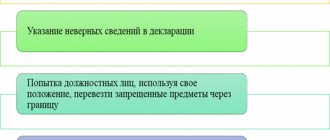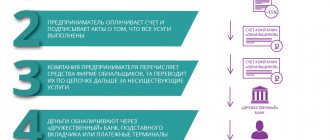Money laundering is the legalization of illegally obtained money in order to be able to freely use the funds.
Regular income of individuals and legal entities passes through the tax office. The Federal Tax Service provides a report on where the funds came from and even partially on what they were spent. If the money was obtained by a criminal illegally, he will not be able to indicate the real source of income, so before spending the money, he needs to “launder” it - to create the appearance that the funds were obtained legally.
What is the scheme of money laundering through individual entrepreneurs?
Sooner or later in the process of entrepreneurship, business owners are faced with a problem - how to get the money they earn? This issue is relevant mainly for legal entities, since individual entrepreneurs already have the right to dispose of the income received at their own discretion. Unlike entrepreneurs, the owners of an LLC cannot simply take funds from the cash register (or withdraw from the organization’s account) for personal needs. First, they will need to pay all required taxes, primarily income tax or personal income tax on dividends.
Consequently, in order to increase their wealth, give employees “black” salaries, finance “gray” transactions and carry out other prohibited actions, company managers resort to fraudulent schemes. Most of them were invented back in the 90s, many are no longer used today, and some still exist. Among them is withdrawal of money through an individual entrepreneur. In connection with the operation is the forgery of documents, the conclusion of worthless contracts and hidden (in some cases obvious) affiliation of responsible persons.
Money laundering methods
Individuals often receive small income on which they do not pay tax. However, law enforcement agencies and the tax inspectorate pay attention only to the unreasonable appearance of an impressive fortune in an individual, since such money is always obtained illegally (robbery, robbery, fraud, etc.). Legally received funds can always be confirmed with appropriate documents. The fraudster’s goal is to obtain such documents using illegally obtained funds.
The most common methods of legalizing funds obtained by criminal means for an individual are the following:
- Officially register the funds as winnings at the casino.
- Transfer funds to offshore companies, and then legalize them as income from the acquisition of very profitable shares.
- Divide the capital into unattractive amounts and transfer them to the bank cards of many trusted persons.
Legal entities and officials who have the opportunity to “pocket” money from the organization’s budget often take the opportunity to enter into agreements with front organizations. Front organizations provide non-existent services and charge the required fee for the official. The operation is carried out officially with all necessary documents completed. Then, funds are transferred from the account of the front organization to the account of the official who ordered the laundering.
We will tell you more about cash-out schemes in a separate article https://lexconsult.online/7093-shemy-obnalichivaniya-denezhnyh-sredstv
All of these schemes are well known and, to a greater or lesser extent, such illegal operations are monitored by law enforcement agencies. But due to the involvement of foreign banks and companies, it can be difficult to prove the guilt of the offender.
What is legal cash?
The term cashing means the transfer of funds from non-cash to cash. The rules of financial circulation in the field of cash are regulated by Directive of the Bank of the Russian Federation No. 3073-U dated October 7, 2013. Legal methods include:
- Receiving money from the bank for salary needs and issuing social funds.
- To issue insurance compensation amounts to individuals.
- For settlements with personnel based on actual operating expenses, including travel expenses.
- For the purpose of settlements with counterparties on concluded transactions.
- When issuing funds for previously paid but returned goods or services by the consumer.
- Personal needs of the entrepreneur - the individual entrepreneur can dispose of funds at his own discretion without any restrictions.
Note! The limit for cash payments between parties to a transaction (except individuals) is limited to 100,000 rubles. under one agreement (clause 6 of the Directive).
Taking into account the above possible spending purposes (a detailed list in paragraph 2 of the Directions), you can withdraw cash absolutely without risk by receiving money from a bank account by check. The document is filled out with the obligatory identification of the purpose and amount to be received. Reasons for spending include issuing dividends to the founders of the company. Or you can withdraw funds using a corporate card. In this case, the responsible employee keeps records of the funds spent, and the person who received the money is required to draw up advance reports. However, all of these options have significant disadvantages. Firstly, this is a limitation on the maximum amount of funds allowed for withdrawal. Secondly, the obligation to pay taxes on the income of participants.
Principles of non-cash payments
The considered settlements through the bank are carried out only if the relevant document is available. For example, this could be a written order, a court order, a writ of execution and other documents. The write-off is carried out on the basis of the corresponding order. In some cases, the write-off is carried out without an order. For example, this procedure is performed in cases where there is a corresponding requirement from the creditor. The right to write off at the request of the lender must be specified in the service agreement.
The next important principle is urgency. There are the following banking procedures: processing official papers, debiting funds, crediting money to accounts. Almost all of these operations have specific deadlines. The latter are usually approved by each specific bank.
FOR YOUR INFORMATION! Payment security involves the execution of payments from accounts within the amounts available on them. That is, there is a certain amount in the organization’s accounts. You cannot withdraw funds beyond this amount.
The next principle is the free selection of a form for non-cash payments. There are many forms for calculations, which were given above. This is collection, letter of credit, etc. The company can independently choose the form that is suitable for itself.
Unification of payment documents is also important. Settlement papers are drawn up in a certain form. They can be electronic or paper. The papers contain these details:
- Calculation form.
- Name of settlement papers.
- Date of statement from the current account, account number.
- Information about the parties to the transaction (payer and his counterparty): name of the legal entity, account number, TIN, address, sub-account number.
- The amount of payment and its direction.
- Sequence of payments.
- Additional nuances.
Documents will not be valid without a seal and signature.
Popular cash out options through individual entrepreneurs
All existing cash-out schemes with the help of individual entrepreneurs come down to one thing - crediting funds to the entrepreneur and then withdrawing the money. Since an individual entrepreneur can use his income without restrictions, tax payments and reporting. Whatever method is chosen, if it is deliberately false and involves the preparation of fake supporting documentation, as well as the formation of fictitious mutual settlements, this option is considered illegal. When fraud is detected, state control authorities hold violators accountable for cashing out through individual entrepreneurs.
Popular schemes for illegal cash withdrawals:
- Opening an individual entrepreneur for cash withdrawal is the most common method of money laundering. Involves registration of an entrepreneur for cashing out. Often, company managers create individual entrepreneurs in their own name or use dummies. To justify financial transactions, fictitious contracts for the sale and purchase of services and goods are concluded, offsets are carried out, false loans are issued, etc. From the point of view of control authorities, such actions are certainly a violation and are punishable by appropriate punishment.
- Involvement of banking structures - this scheme involves the use of unscrupulous private banks, which (when contacting the right persons) provide cash withdrawal services. Operations are carried out on counter flows through numerous transfers through shell companies. Ultimately, figuring out what’s what is quite difficult, and after the expiration of the three-year statute of limitations, it is no longer relevant. If it is possible to prove fraud, liability threatens all participants, including banks.
- Using personal deposits of individuals for transfers - an entrepreneur transfers funds in favor of a citizen who first opens a deposit in the bank.
- Writing off money through employees of individual entrepreneurs is carried out by transferring it to the cards of individuals to reimburse fictitiously registered accountable expenses. In principle, this is a completely legal procedure, but if the withdrawal of funds reaches millions, this, of course, will attract the attention of tax authorities.
- Use of maternity capital - in the process of this scheme, false real estate transactions are carried out, in payment for which money is taken from maternity capital.
First of all, when a company decides to cash out money through an individual entrepreneur, a search for a suitable candidate is carried out. After that, a business is registered in the name of an individual and a bank account is opened. Then an illegal withdrawal of funds is carried out, then the money is transferred to the payer minus the agreed percentage for the provision of cash-out services. At the same time, many violators believe that they are not in danger and it is very difficult to detect fraudulent actions. However, it is not.
Signs of illegal cash circulation:
- Short period of commercial activity.
- Implementation of individual entrepreneurs for a business that is not included in the OKVED list of workers.
- Downtime in real areas of activity.
- Opening bank accounts in territories remote from the place of registration of individual entrepreneurs.
From AFK to FBK: who is being persecuted for money laundering
In the early 90s, Russia was preparing to become a member of the Council of Europe. To do this, it was necessary to fulfill a number of conditions. For example, bring national legislation into line with the Council of Europe Convention on Laundering, Search, Seizure and Confiscation of Proceeds from Crime. The first step was Decree No. 1016 and Order No. 460-rp of 1994, which outlines a plan to combat money laundering. And two years later, Art. 174 of the Criminal Code of the Russian Federation (legalization or laundering).
What is “legalization”? A citizen receives money or acquires property, knowing that it was obtained illegally.
According to the article, it was planned to punish those who knowingly dealt with illegal income in order to give them a legitimate appearance, says Pen&Paper partner Alexey Dobrynin. But in fact, the norm did not work and corresponded to international provisions only in form. It did not respond to the real fight against money laundering, notes lawyer Feoktistov and partners Feoktistov and partners Federal Rating. Group Criminal Law Vladislav Kudryavtsev. “This is due to the long absence of an anti-money laundering law, which should contain an extensive set of financial monitoring measures to identify such crimes. Without them, identifying facts of money laundering is like looking for needles in a haystack,” the expert adds. The law under discussion was adopted only in 2001, and in parallel with it, Art. itself was changed. 174 of the Criminal Code.
History of Article 174 of the Criminal Code
- 1996: The Criminal Code of the Russian Federation was adopted, Art. 174 of the Criminal Code (legalization or laundering). Punishment ranges from a fine of 100 minimum wages to imprisonment with confiscation of property for 10 years.
- year 2001:
- 1. Responsibility was divided by separating Art. 174.1 CC. According to it, punishment was provided for those who legalize property received during the commission of a crime by them, and not by someone else.
- 2. The source of origin of money or other property was limited to an indication of criminal origin.
- 3. It was prescribed that only those who “laundered” a large amount or more (2000 minimum wage) will be held criminally liable.
- 4. They indicated that property “laundered” due to tax (Articles 198–199 of the Criminal Code) and customs (Articles 193–194 of the Criminal Code) crimes does not fall under this norm.
- 2003: a large composition becomes a qualifying feature (aggravating circumstance) and starts from 1 million rubles.
- 2010:
- 1. Partially decriminalized the use of funds that the attacker received from the crime committed.
- 2. A large train is counted at 6 million rubles.
- year 2013:
- 1. Large size began to be counted from 1.5 million rubles, and especially large - from 6 million rubles. Thus, the threshold size of the qualifying feature (aggravating circumstance) of this norm was reduced four times.
- 2. Property laundered for tax (Articles 198–199.2 of the Criminal Code) and customs (Articles 193–194 of the Criminal Code) crimes began to fall under this norm.
- 3. Qualifying and specially qualifying features of crimes under Art. 174 and art. 174.1 CC.
- 2019: Criminal money converted from cryptocurrency was also considered legal.
It’s difficult to investigate and difficult to imprison
According to statistics from the Judicial Department of the Supreme Court, the number of convictions for “laundering” is less than 0.01 of all convictions under various articles of the Criminal Code. This is not surprising, because legalization is one of the most difficult crimes to detect not only in Russia, but throughout the world, says Artem Grishin, deputy managing partner of the Alliance Legal Consulting Group Alliance Legal Consulting Group Federal rating. group Sanctions law group Criminal law group PPP/Infrastructure projects Company profile. He notes that in most cases cases under Art. 174 of the Criminal Code is initiated when investigating other offenses.
Because of this, the attacker is usually accused of legalization when a case has already been filed against him for some other crime. Art. 174 of the Criminal Code becomes the second composition for him. This is evidenced by statistics from the Judicial Department: 2/3 of those convicted under Art. 174 of the Criminal Code it was an additional qualification. The Plenum of the Supreme Court in Resolution No. 32 of July 7, 2015 “On judicial practice in cases of legalization” explained that the court’s conclusion about the illegal nature of property can also be based on a decision to terminate a criminal case for the main crime due to non-rehabilitating circumstances. But only if the case materials contain the necessary evidence.
There are also problems with accurately determining the signs of such crimes, so investigators often go by feel and proceed from their own understanding of “laundering,” which may differ greatly from the actual definition of legalization, states Kudryavtsev. And large volumes of documentary evidence in such cases are beyond the capabilities of the investigative authorities.
It is almost impossible to impute the legalization of other people's criminal proceeds (Article 174 of the Criminal Code), this article is unviable. A person doesn’t shout at every corner that “I stole here, let’s turn it into real estate or check it on the brokerage market.” So far, the qualifications of Russian investigative workers do not allow them to resolve issues of proof of this level.
Vyacheslav Yablokov, managing partner of Yablokov and partners Yablokov and partners Regional rating. group Tax consulting and disputes group Criminal law group Dispute resolution in courts of general jurisdiction
The difficulty lies in the fact that in order to be held accountable for “laundering”, it is necessary to prove the fact of another crime from which the “legalized” proceeds were received, explains senior partner Koblev and partners Koblev and partners Federal Rating. Group Criminal Law Company profile Ruslan Zakalyuzhny: “They can be mixed with “clean” or other property, and this can present considerable difficulties during the investigation.” In addition, the security forces must establish that the accused knew in advance about the criminal origin of the money and other property.
According to Vladimir Kitsing from Knyazev and partners Knyazev and partners Federal rating. group Criminal law Company profile, this point is difficult to confirm solely by the factual circumstances of the case. But the confessions of the attackers and the testimony of witnesses who know about the circumstances of certain transactions are suitable. In addition, the results of operational investigative activities will be useful, adds the ex-investigator for particularly important cases of the Main Investigative Committee of the SKP, senior partner of the Law Office ZKS Law Office ZKS Federal rating. Criminal Law group 16th place in terms of revenue per lawyer (less than 30 lawyers) 41st place in terms of revenue Company profile Andrey Grivtsov: “Taps of telephone conversations or surveillance using secret audio recordings, during which the relevant agreements are recorded.”
Managers are under threat
Now Art. 174 of the Criminal Code is regularly used in cases where criminal proceeds are invested in a business or transferred to the accounts of controlled companies and then cashed out, explains Dobrynin. Security forces interpret such operations as “laundering.” The composition under discussion should not be confused with Art. 174.1 CC. It punishes those “legalizers” who themselves committed a crime and received illegal profits from it.
Situations in which they may be accused of legalization
1. Stolen real estate is acquired by one citizen, then hastily sells it to another at a price that is lower than the market price. There is no evidence that buyers paid money in these transactions. That is, there are no real calculations or economic feasibility in operations, explains Kudryavtsev. Such counterparties become suspects.
2. The contract of sale or donation of stolen property is fake. A case can be opened against buyers and recipients.
3. A business partner unexpectedly returns a large debt to your account from funds the origin of which looks suspicious. And you start spending this money on your needs.
4. The company buys stolen property and then sells it offshore. The deal will raise suspicion.
As a rule, such crimes are organized by those who occupy managerial positions. Bank employees often turn out to be a kind of cover and conductors of financial transactions, Zakalyuzhny warns. About a fifth of those accused under Art. 174 Criminal Codes are individual entrepreneurs and managers of commercial organizations, based on practice, says Kitsing.
Persons usually charged with legalization
1. They make transactions with criminal property.
2. Falsify civil contracts and other reporting documentation.
3. They have shell companies among their counterparties and use significant amounts of cash.
4. Conduct transactions with companies that are registered offshore.
Tips for defending against criminal cases
Since legalization must always be preceded by some other (main) crime, a common defense tactic would be to prove that it never happened. If it is possible to refute the prosecution’s version of tax evasion or theft of property, then subsequent payments for saved money or transactions with property are not considered “laundering,” explains Dobrynin. In addition, legalization requires a special goal - to give legal appearance to the possession, use or disposal of criminal proceeds, the expert adds: “The lack of proof of such a goal also indicates the absence of evidence.” But Kudryavtsev warns that investigators often ignore the need to prove a controversial point.
Neftyanoy Bank case
According to investigators, in the early 2000s, bank managers opened accounts for individuals and legal entities that were completely under their control. The bank maintained black accounting and used forged payment documents, security officials alleged. To conceal illegal transactions, the bankers allegedly even created a separate automated system. The bank's clients included more than 10 shell companies, which were issued multibillion-dollar ruble loans for various activities. The organizers of the scheme received income in the form of interest and commissions for services provided. In addition, the bankers underestimated the amount of taxable profit and caused damage to the state in the amount of 32 million rubles, investigators say. As a result, the prosecution was able to prove the involvement of top managers only in illegal banking activities, and under Art. 174 of the Criminal Code, the Tagansky District Court of Moscow acquitted the defendants in 2008.
Moreover, not every transaction can lead to legalization, the expert emphasizes. Thus, transactions with individually defined property never hide the source of origin of the property. We are talking about lease agreements, free use or trust management of assets. As a result of such transactions, the connection between criminal proceeds and their source of origin is not interrupted, Kudryavtsev notes: “This can become the main argument in favor of protection.”
The case of Vladimir Yevtushenkov
In 2014, the head of AFK Sistema was accused of money laundering (Part 4 of Article 174 of the Criminal Code of the Russian Federation) when purchasing shares in Bashneft and other enterprises of the Bashkir fuel and energy sector from Ural Rakhimov’s structures in 2009. The security forces doubted the legality of the privatization of these assets, so the investigation also questioned the legality of the deal to sell the oil company to AFK structures for $2.5 billion. The case against Yevtushenkov was closed in January 2016, because no crime was found in his actions. The shares eventually went to the state and then went to Rosneft.
Thus, the defense in such cases needs to refute two main facts. Firstly, that the property was originally acquired by someone else through criminal means. And secondly, the buyer immediately knew: the seller himself acquired this asset illegally. This is where lawyers should focus their efforts, says Grivtsov.
The case of Alexander Belov-Potkin
Since 2010, the well-known nationalist has been accused of legalizing the property of the Kazakh BTA Bank, but he was detained only in 2014. The investigation believes that Belov-Potkin entered into a conspiracy with the chairman of the board of directors of BTA Bank and the former Minister of Energy of Kazakhstan Mukhtar Ablyazov. According to the prosecution, a foreign official suggested that the nationalist create an extremist community and use money stolen from the bank for its development. In 2016, the first instance sentenced the politician to seven years and six months in a general regime colony, but then the case was sent for further investigation. After which the final decision was three and a half years of imprisonment, which the Moscow City Court imposed on the accused in the spring of 2022 (case No. 10-1850/2017).
In addition, the presence of a conviction for the underlying crime does not mean that the defendant will automatically be charged with money laundering, Keatsing notes. If we analyze acquittal decisions under Art. 174 of the Criminal Code, the courts usually indicate that the transactions charged to the accused were of a civil nature and were carried out without criminal intentions, summarizes senior lawyer Bryan Cave Leighton Paisner (Russia) LLP Bryan Cave Leighton Paisner (Russia) LLP Federal rating. group Antimonopoly law (including disputes) group Arbitration proceedings (medium and small disputes - mid market) group Foreign trade activities/Customs law and currency regulation group PPP/Infrastructure projects group Land law/Commercial real estate/Construction group Intellectual property (Protection of rights and litigation) group Intellectual property (Consulting) group International arbitration group Tax consulting and disputes (Tax disputes) TMT group (telecommunications, media and technology) group Transport law group Labor and migration law (including disputes) group Digital economy group Bankruptcy (including disputes) (high market) group Compliance group Corporate law/Mergers and acquisitions (high market) group International litigation group Tax consulting and disputes (Tax consulting) group Natural resources/Energy group Family and inheritance law group Criminal law group Pharmaceuticals and healthcare group Financial/Banking law Private Capital group 2nd place By revenue 2nd place By revenue per lawyer (more than 30 lawyers) 5th place By number of lawyers Company profile Angela Glamazdina.
Composition in the Navalny case
The Investigative Committee opened the case of money laundering on August 3, 2019, a week after the first of the unauthorized protests against the exclusion of independent candidates from the Moscow City Duma elections, which ended in mass arrests.
FBK case of Alexei Navalny
According to investigators, over the past three years, employees of the Anti-Corruption Fund received a large amount of money in rubles and foreign currency from third parties. These funds, according to the Investigative Committee, were obtained through criminal means, which FBK immediately knew about. To legalize this money, the accomplices allegedly deposited it through ATMs into the settlement accounts of several banks, after which they transferred it to the current settlement accounts of FBK.
At the request of the Investigative Committee, FBK accounts were seized, and searches were carried out in the organization itself and at the home addresses of its employees. Another series of searches in connection with the case took place on September 5 at the foundation’s office, the studio of the Navalny Live Internet TV channel and the politician’s headquarters. During the investigation, security forces detained eight people, but all were released after interrogation.
The week before last, investigative actions were carried out on 200 people in 43 Russian regions. In total, the Basmanny District Court authorized 94 searches according to the orders of investigator Rustam Gabdullin, who is leading the case under Art. 174 of the Criminal Code, says the head of the politician’s headquarters, Leonid Volkov. Kitsing explains this number of investigative actions by the fact that their number is not limited during a preliminary investigation.
The official position of the Investigative Committee on this issue: “<...> during searches, objects and documents that are important for the investigation are confiscated.” Given this wording, the security forces have a free hand to select persons who are potentially of interest to the investigation, lawyer Kitsing is sure. According to Grivtsov, a search often pursues two goals: firstly, it is a forceful psychological action to intimidate and suppress the will to resist, and secondly, during the search one can find any prohibited items and “reinforce flimsy evidence in the main case a new reinforced concrete episode,” explains the former investigator.
The judicial prospects of the case itself look dubious, given the plot voiced in the media, Grivtsov assures. He draws attention to the fact that there is still no criminal case regarding the criminal misappropriation of property, which was later allegedly legalized.
Do we need this norm?
There is no consensus in the expert community about the correctness of the composition in its current form. Former deputy chairman of the State Duma Committee on Civil, Criminal, Arbitration and Procedural Legislation Andrei Nazarov even proposed removing Art. 174.1 – “Legalization (laundering) of funds.” He explained this by the fact that according to this standard the punishment is now more severe than for premeditated murder with aggravating circumstances. But not everyone agrees with the ex-deputy’s approach. Firstly, because “laundering” illegal money is an international crime. It is also part of the state strategy to combat money laundering, adds Alexander Inoyadov, lawyer at the law firm BMS Law Firm BMS Law Firm Federal Rating. .
The main problem is different. In practice, security forces consider any disposal of illegal means to be legalization. This situation is dangerous because the accused is punished twice for the same thing, explains Kudryavtsev. This cannot be corrected by “applying a plantain”, canceling some article or changing the amount of damage, the lawyer is sure. The legislator needs to clearly explain what it means to “give legal form to the possession, use and disposal” of criminal property or money, the expert summarizes.
The material is a joint project of OVD-Info and Pravo.ru.
- Alexey Malakhovsky
- criminal process
Responsibility of individual entrepreneurs for cash withdrawal
Detection by control bodies of facts of violation of cash circulation by business entities leads to liability in accordance with the norms of current Russian legislation. First of all, punishment is provided for officials involved in fraud. Banks that facilitate illegal money laundering face official revocation of their licenses.
Cashing out money through an individual entrepreneur is a liability under the articles of the Criminal Code of the Russian Federation:
- Stat. 171 – carrying out illegal business leads to a maximum penalty of arrest for up to six months or a fine of up to 300,000 rubles.
- Stat. 174 – fraudulent money laundering, depending on the size, leads to a maximum sentence of forced labor of up to 5 years or a fine of up to 1,000,000 rubles. The exact penalties depend on whether the individuals colluded and the aggregate amount of illegal money laundering.
- Stat. 198 – intentional evasion by a citizen from paying tax obligations and fees leads to maximum fines of up to 500,000 rubles. or arrest up to 3 years.
- Stat. 199.2 – knowingly deliberate concealment of taxable funds entails a fine of up to 2,000,000 rubles. maximum or arrest up to 7 years.
- Stat. 327 – falsification of documentation, including leading to punishment of officials in the form of arrest for up to six months or correctional labor for up to 2 years.
Conclusion - in this article we looked at what liability for cash withdrawal through an individual entrepreneur is provided for by the criminal legislation of the Russian Federation. The elements of crimes are presented in accordance with the norms of the current criminal and civil legislation of Russia. If the committed act can be qualified as administrative, the norms of stat. 15.30 Code of Administrative Offenses – fine up to 50,000 rubles. against officials or removal from office for up to 2 years.
Issuance of funds on account
This is not a universal way to receive cash, but rather an opportunity to cover small expenses of the founder with company funds. All expenses must be supported by documents - checks, acts, invoices, etc.
The use of accountable funds and entertainment expenses is possible in the following cases:
- purchasing equipment for office furnishings;
- purchase of equipment, computers, smartphones for company management;
- payment of travel and accommodation expenses in the Russian Federation or in another country aimed at establishing business connections of the organization;
- payment for meals in a restaurant, entertainment events organized to attract investors and improve the company’s image, etc.
All documents proving the purpose of these expenses to increase the profitability of the business must be collected and stored. Since such expenses reduce the tax base, the Federal Tax Service closely monitors the feasibility of such expenses.
Conclusion
We have identified five main ways to legally cash out company money. Each of them has both advantages and disadvantages. Particular attention should be paid to financial losses when cashing out - some methods involve paying a bank commission, which can be a maximum of a couple of percent of the requested amount, while another method involves paying tax on the entire amount, and maybe insurance premiums.
Taking into account the above, we recommend that when choosing a cash-out method, you weigh the pros and cons and, regardless of legal requirements, collect documents confirming certain expenses of the company.






